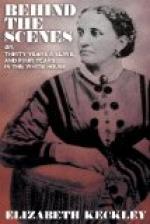I was sick a great deal—in fact, I had suffered with chills and fever ever since Mr. Reid bought me. He, therefore, concluded to sell me, and, in November, 1844, he took me back to Richmond, placing me in the Exchange building, or auction rooms, for the sale of slaves. The sales were carried on in a large hall where those interested in the business sat around a large block or stand, upon which the slave to be sold was placed, the auctioneer standing beside him. When I was placed upon the block, a Mr. McGee came up and felt of me and asked me what I could do. “You look like a right smart nigger,” said he, “Virginia always produces good darkies.” Virginia was the mother of slavery, and it was held by many that she had the best slaves. So when Mr. McGee found I was born and bred in that state he seemed satisfied. The bidding commenced, and I remember well when the auctioneer said; “Three hundred eighty dollars—once, twice and sold to Mr. Edward McGee.” He was a rich cotton planter of Pontotoc, Miss. As near as I can recollect, I was not more than twelve years of age, so did not sell for very much.
* * * * *
Price of slaves.
Servant women sold for $500 to $700, and sometimes as high as $800 when possessing extra qualifications. A house maid, bright in looks, strong and well formed, would sell for $1,000 to $1,200. Bright mulatto girls, well versed in sewing and knitting, would sometimes bring as high as $1,800, especially if a Virginian or a Kentuckian. Good blacksmiths sold for $1,600 to $1,800. When the slaves were put upon the block they were always sold to the highest bidder. Mr. McGee, or “Boss,” as I soon learned to call him, bought sixty other slaves before he bought me, and they were started in a herd for Atlanta, Ga., on foot.
* * * * *
Started for A cotton plantation.
Boss, myself and ten others met them there. We then started for Pontotoc, Miss. On our way we stopped at Edenton, Ga., where Boss sold twenty-one of the sixty slaves. We then proceeded on our way, Boss by rail and we on foot, or in the wagon. We went about twenty miles a day. I remember, as we passed along, every white man we met was yelling, “Hurrah for Polk and Dallas!” They were feeling good, for election had given them the men that they wanted. The man who had us in charge joined with those we met in the hurrahing. We were afraid to ask them the reason for their yelling, as that would have been regarded as an impertinence, and probably would have caused us all to be whipped.
* * * * *
My Mississippi home.
At length, after a long and wearisome journey, we reached Pontotoc, McGee’s home, on Christmas eve. Boss took me into the house and into the sitting room, where all the family were assembled, and presented me as a Christmas gift to the madam, his wife.




